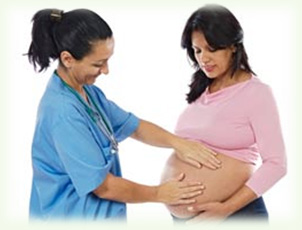

What is the THRIVE trial?
There are a number of parenting support programmes running in Scotland that are designed to improve the health and wellbeing of mothers and babies. This study will compare the efficacy and cost-effectiveness of two antenatal parenting support programmes, Enhanced Triple P for Baby and Mellow Bumps against the normal antenatal care received during pregnancy (care as usual). We are also interested in finding out if any initial benefits carry on as the infant grows. Enhanced Triple P for Baby and Mellow Bumps both aim to reduce child maltreatment by improving mother’s understandings of child development and promoting positive parenting skills; however they do this in different ways. Enhanced Triple P for Baby focuses upon teaching parenting skills, managing expectations about parenthood and teaching coping skills to help mothers meet the challenges of parenting a new baby. Mellow Bumps focuses upon reducing maternal stress, promoting a healthy mother-infant bond and encouraging responsive, nurturing parenting practices. A rigorous evaluation of the two programmes may help health practitioners to offer the right kind of support to improve maternal mental health, the mother-child interaction and promote language development in the infant.
Why is this study important?
The early years have been identified as a critical stage in children’s development, with research suggesting that intervening within the first three years of life provides the most benefit to child health and wellbeing. There is growing evidence that women who have additional health and social care needs in pregnancy are more likely to experience stress, anxiety and depression. This can result in the developing foetus being exposed to high levels of stress hormones and can negatively affect the baby’s stress response, which in turn can result in a fractious baby that the mother can find difficult to soothe. In addition, experiencing stress, anxiety and depression during pregnancy can adversely affect mothers’ ability to bond with her child. Poor maternal mental health and poor mother-infant bonding both increase the risk of child maltreatment.
The Scottish Government is committed to ensuring that all parents receive support in order to ensure that their children grow up to be safe, healthy, achieving, nurtured, active, respectful, responsible and included. Whilst most children will achieve these goals, there is evidence that exposure to high levels of parental stress and maltreatment can hinder children’s development. By age 3 it has been shown that there are clear gaps between the development of children whose parents face such stresses and those being brought up in less stressful households. These gaps continue throughout life, with evidence of inequalities seen in educational achievements, employment, criminal convictions, substance misuse and sexual behaviour. Providing parenting interventions during pregnancy has therefore been identified as a possible means of improving outcomes for children.
The THRIVE trial aims to assess whether providing parenting support programmes to pregnant women with additional health and social care needs during the antenatal period can help children achieve these goals. In particular, the study will assess whether parenting support programmes can help children feel nurtured (by improving mother-child bonding) safe (by reducing A&E admissions and placements on the child protection registry), and achieving (by measuring the effect of the interventions on language development). We will also assess whether the programmes improve maternal mental health and wellbeing.
Delivering the interventions?
If you are a THRIVE Group Facilitator you will receive training for your chosen intervention in order to ensure that you feel confident in delivering it to the participants. Mellow Bumps will provide one day of training and Enhanced Triple P for Baby will provide 5 days. All practitioners trained in Enhanced Triple P for Baby and Mellow Bumps will be invited to become involved in the evaluation of both training packages in order to assess their impact and value.
Data collection will occur at three time points: pre training, immediately post-training and following 12 months experience of delivering the interventions. We will collect this information from you via questionnaires. You will also be asked to complete a short checklist after each session in order to keep track of the content.
We would like to conduct semi-structured interviews with some of the practitioners at the pre-training and 12 months delivery sessions. You will be asked questions about your expectations and experiences of taking part in the interventions. In addition we would also like to interview practitioners who faced challenges in their sessions such as high drop-out rates or difficult group dynamics in order to examine the reasons behind such difficulties.
In order to evaluate the women’s involvement in the sessions we would like to either video-/audio- record some of the interventions or one of our researchers may observe these sessions as they are delivered. We would only do this if we got full consent from both the practitioners and the participants involved in the study. Practitioners will be asked to undergo supervision throughout the intervention period.
What will supervision involve?
Both Enhanced Triple P for Baby and Mellow Bumps include a supervision model which involves self-reflection, peer support and clinical supervision with practitioners who are experienced in delivering the interventions. As a key aspect of supervision for Enhanced Triple P for Baby practitioners will be asked to review audio-or videotaped samples from intervention sessions to self-evaluate in the context of a professional supportive group of peers. Consent will be sought from the parents involved to audio- or video-record the sessions.
Who has reviewed the study?
This study has been reviewed and approved by the West of Scotland NHS Research Ethics Committee (3).
